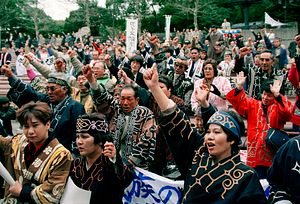Japan’s rapid industrialization to become an economic superpower is remembered proudly by the Japanese. But the race to modernization came at the expense of the native Ainu population, who were deliberately stripped of their language, ancestral land, and traditional livelihood. Despite resisting attempts to wipe out their culture, the Ainu have suffered a history of discrimination and poverty.
The traditional Ainu way of life is deeply rooted in nature and they flourished by hunting salmon, bear, and deer in the wilderness. Their distinct language, female facial tattoos, traditional weaving, and the worship of spiritual energy are the hallmarks of Ainu identity, making them physically and culturally distinct from their ethnically Japanese counterparts.
Ainu culture as it is known today can be traced back to northern Japan sometime between the 12th and 13th century. They called the territory “Ainu Mosir,” meaning “land of humans.” It was annexed by Japan in the late 19th century and a “Colonization Board” was set up to encourage Japanese immigration with the support of free land, travel money, farming tools, and food. The Ainu were dispossessed of their ancestral lands and sacred sites were destroyed.
Japan’s myth of a homogeneous society is the work of 150 years of forced assimilation. By 1870, it became illegal for Ainu to speak their language, and eventually they were banned from hunting and forced to adopt Japanese names and attend mainstream schools. Then-Prime Minister Yasuhiro Nakasone angered Ainu human rights activists in 1986 by publicly declaring Japan a “racially homogeneous nation.” Meanwhile, a member of the Hokkaido prefectural assembly, Masaru Onodera, stirred controversy in 2014 saying it was “highly questionable” the Ainu were the indigenous people of northern Japan. While under regular attack, Ainu activists have fought for wider recognition and the revival of their traditions and language.
But change could be on its way. Japan’s Asahi newspaper reported that a new draft bill will be proposed to the diet recognizing the Ainu as Indigenous and banning discrimination against them. The bill represents the government’s revised approach to Ainu policy. It will relax restrictions on subsistence fishing and aim to lift overall living standards with the help of a $9 million subsidy to promote Ainu culture as a tourism resource and provide bus operations to support Ainu communities.
Not everyone agrees with the government’s new reforms. Professor Hiroshi Maruyama, an expert in environmental and Indigenous studies at the Muroran Institute of Technology in Hokkaido, is fiercely critical of the cabinet’s latest draft, denouncing it as another form of colonial policy. “On the surface you can find superficial recognition but there is nothing positive for the Ainu in the draft bill in terms of international human rights standards,” he asserts.
The full details of the draft bill are expected to be unveiled to the public at a cabinet meeting this week. However, Maruyama says on closer inspection there isn’t any reference as to whose expertise helped draft the bill.
According to Maruyama, Ainu factions such as the Sakhalin Ainu Association, Monbetsu Ainu Association, and Citizens Alliance for the Examination of Ainu Policy were left in the dark, which is inconsistent with international human rights standards that demand “free, prior and informed consent.” He believes that by avoiding an array of Ainu perspectives the government continues to colonize the Ainu people.
“The Ainu can hardly reflect their own opinions on issues that affect them,” he stressed. “The Hokkaido Ainu Association is the largest Ainu association and works closely with the government. They have given their tick of approval and the government sees them as the only window to negotiate with. But it doesn’t cover the entire Ainu population.”
The timing of the bill’s proposal also coincides with the government’s objective to achieve 40 million international tourists in time for the Tokyo Summer Olympics in 2020.
While the Hokkaido Ainu Association is preparing for the possibility of showcasing Ainu traditional song and dance at the Olympic opening ceremony, the government has also announced a National Ainu Museum and Park in Hokkaido in 2020 in the hopes of attracting 1 million tourists to the region annually.
Maruyama expresses doubts as to the government’s motives, saying the bill focuses on a tourist-oriented Ainu policy. He worries that municipalities will seek to secure extra subsidies in the name of Ainu culture and then develop the local area — rather than Ainu people themselves benefitting.

































